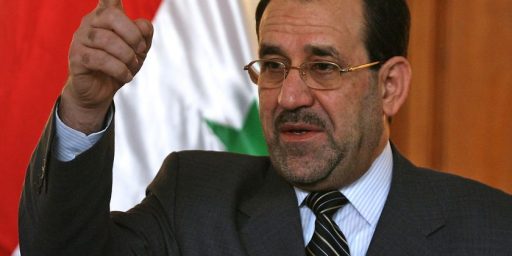Shiites Call for Own State in South
Another complication has arisen in the efforts of the Iraqis to write a permanent constitution: The demand by some leaders of the largest faction for an autonomous Shiite region.
Shiites Call for Own State in South (WaPo, A13)
Waving posters of Iran’s late Ayatollah Ruhollah Khomeini, thousands of chanting Shiite Muslims signaled approval for a call Thursday by their leaders for a separate Shiite federal state in central and southern Iraq. The demand by one of the government’s dominant Shiite religious parties, the Supreme Council for the Islamic Revolution in Iraq, came five days before a draft of Iraq’s new constitution is due. The call, which triggered immediate protests by Sunni Muslim leaders and some Shiite officials, capped increasingly assertive moves by the party to influence the new Iraq as it takes shape.
“What have we gotten from the central government but death?” Hadi Amiri, leader of an Iranian-trained Shiite militia that is the party’s private security contractor, demanded at a rally attended by thousands at a stadium here in the Shiite holy city of Najaf.
Aside from the aqueduct, sanitation, and roads, of course.
An Iranian-influenced Shiite state in the south would be contrary to what U.S. leaders hoped for when they invaded Iraq and overthrew Saddam Hussein in 2003. A senior U.S. military official in Baghdad on Wednesday identified relations with Iran as the biggest long-term challenge facing Iraq’s central government. In Baghdad on Thursday, political leaders representing Shiites, Sunnis, ethnic Kurds, secular Iraqis and other interests wrestled again over the issue of federalism and other disputes blocking the completion of a draft constitution. The draft is due Monday.
Under the interim constitution now governing Iraq, Prime Minister Ibrahim Jafari’s government and the parliament must dissolve if Monday’s deadline is missed. Elections would then be held to elect a new parliament that would take another try at drafting the charter. U.S. and Iraqi leaders have warned that instability and political violence — including attacks by an insurgency composed of Iraqi and foreign Sunnis that has claimed thousands of lives since Jafari’s government took power April 28 — will likely increase if politicians miss Monday’s deadline.
[…]
Iraq’s political blocs and constitution writers have largely agreed in principle to some kind of separate federal state for the Kurdish north. Kurds, historically persecuted by Iraq’s dominant Arab population, have enjoyed a large measure of autonomy, originally under the protection of a no-fly zone set up after the 1991 Persian Gulf War and enforced by the U.S. and British militaries. But Sunni Arabs, striving to preserve the centralized form of government they dominated for decades, have adamantly opposed a separate Shiite state. That would split Iraq and risk putting the oil-rich south under the influence of neighboring, Shiite-led Iran, Sunni opponents say.
“This was a shock,” Salih Mutlak, the most vocal Sunni on the committee drafting Iraq’s constitution, said Thursday after the Najaf rally. “You are giving Iraq to the Iranians.” “We hoped this day would never come,” Mutlak separately told the Reuters news agency. “We believe that the Arabs, whether Sunni or Shiite, are one. We totally reject any attempt to stir up sectarian issues to divide Iraq.”
It stands to reason, however, that the Shiites, Sunnis, and Kurds would all have to have some substantial level of autonomy. The Kurds, everyone agrees, must have autonomy for historical reasons. The Sunnis, who long dominated the political system despite their minority status, are unlikely to consent to being dominated by the Shiites. And it would make no sense at all for the majority Shiites to share power over local affairs with the Kurds and Sunnis (as would happen absent regional autonomy) while consenting to home rule for the minorities.






When will these Southerners cease demanding their own state? Didn’t we try that once before, and look how that went! No sir, I can’t support ..
[Ms. Litella leans off-camera]
Oh, in IRAQ. Well, that’s completely different, then.
I thought the ones wanting their own state in the south were talking about, y’know, L.A. and San Diego…